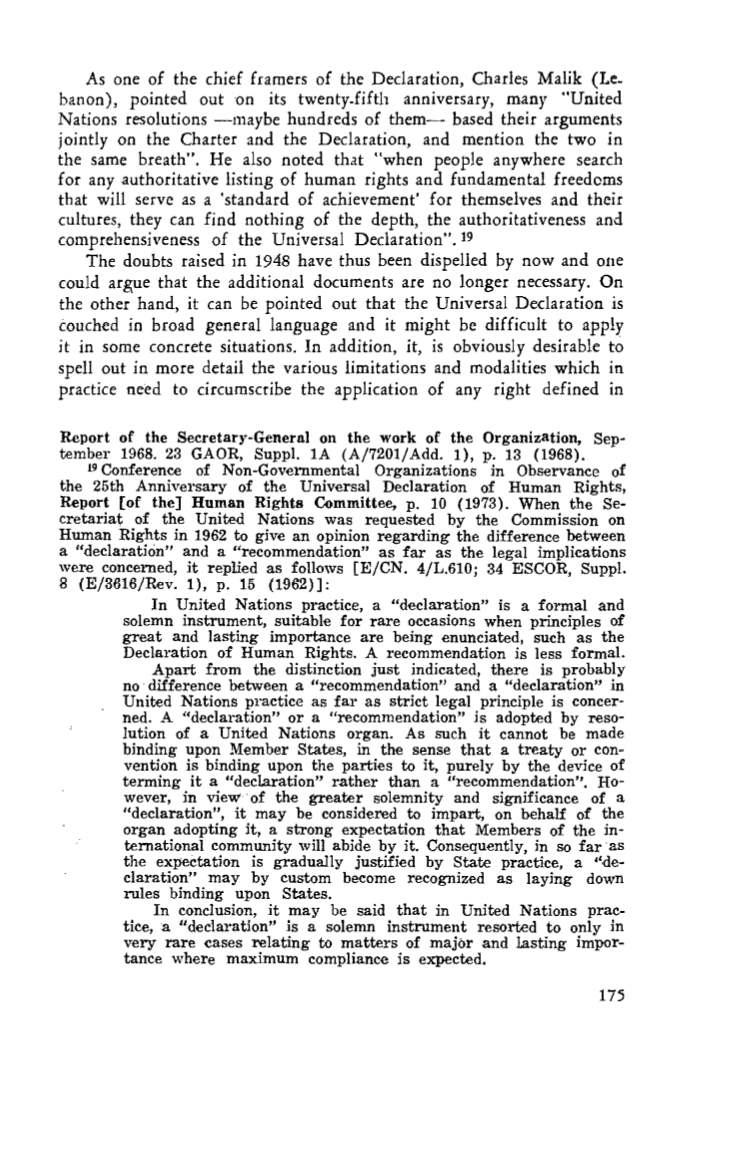
As one of the chief framers of the Declaration, Charles Malik
(Le–
banon), pointed out un its twenty_fifth anniversary, many "United
Nations resolutions -maybe hundreds of them- based their arguments
jointly on the Charter ana the Decla,ration, and mention the two in
the same breath". He also noted that "when people anywhere search
for any authoritative listing uf human rights and fundamental freedoms
tbat will serve as a 'standard of achievement' for themselves and their
cultures, they can find nothing of the depth, the authoritativeness and
comprehensiveness of the Universal Declaration",19
The doubts raised in
1948
have thus been dispelled by now and oue
could argue that the additional documents are no longer necessary. On
the other hand, it can be pointed out that the Universal Dedaration is
éouched in broad general language and it might be difficult to apply
it
in some concrete situations. In addition, it, is obviously desirable to
spell out in more detail the various limitations and modalities which in
practice need to circumscribe the application of any right defined in
Report of the Seeretary-General on the work of the Organization, Sep–
tember 1968. 23 GAOR, Suppl. lA (A/7201/Add. 1), p. 13 (1968).
19
Conferenee of Non-Governmental Organizations in Observance of
the 25th Anniversary of the Universal Dedaration of Human Rights,
Report [of the] Human Rights Committee, p. 10 (1973). When the Se–
eretariatof the United Nations was requested by the Commission on
Human Rights in 1962 to give an opinion regarding the differenee between
a "dec1aratión" and a "reeommendation" as far as the legal implications
\Vere eoneerned, it replied as follows [E/CN. 4/L.610j 34 ESCOR, Suppl.
8 (E/3616/Rev. 1), p. 15 (1962)]:
In United Nations praetiee, a "dedaration" is a formal and
solemn instrument, suitable for rare occasions when principIes of
great and lasting importance are being enunciated, suoh as the
Deelaration of Human Rights. A recommendation is less formal.
Apart from the distinction just indícated, there is probably
no' difference between a "recommendation" and a "declaratíon" in
Uníted Nations practice as far as striet legal principie is concer–
ned. A "dec1aration"
01'
a "recommendation" ls adopted by reso–
lution of a United Nations organ. As such it cannot be made
binding upon Member States, in the sense that a treaty
01'
con–
vention is binding upon the parties
to
it, purely by the devÍCe of
terming it a "decLaration" rather than a "recommendation". Ho·
wever, in vie'W" of the greater soIemnity and significance of a
"declaration", it may be considered
to
impart, on behalf of the
organ adopting it, a strong expeetation that Members of the in–
temational community
\Vill
abide by it. Consequently, in so faras
the expectation is gradually justified by State practiee, a "de–
claration" may by custom become reeognized as laying down
rules binding upon States.
In conclusion, it may be said that in United Nations prac–
tice,
~
"declaration" is a solemn instrument resorted to only in
very rare cases relating to matters of majQr and lasting impar–
tance where maximum complianee is expected.
175


